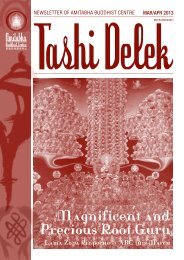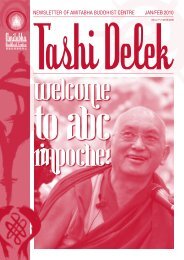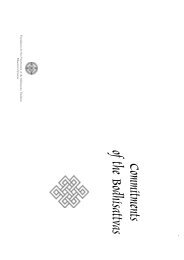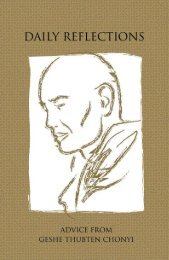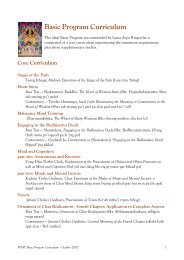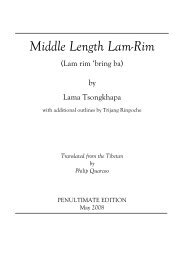How to Generate Bodhicitta (English) - Amitabha Buddhist Centre
How to Generate Bodhicitta (English) - Amitabha Buddhist Centre
How to Generate Bodhicitta (English) - Amitabha Buddhist Centre
You also want an ePaper? Increase the reach of your titles
YUMPU automatically turns print PDFs into web optimized ePapers that Google loves.
The root text of The Seven-Point Thought Transformation says, "Meditate on the great kindness of all sentientbeings."On the basis of these quotations you should realise the advantage of cherishing others. For instance, all thehappiness of the human rebirth and other fortunate rebirths—having perfect wealth, surroundings, relationsand so forth—comes from altruism, cherishing others. Why? Due <strong>to</strong> cherishing others' lives you abandonkilling, and the result of abandoning killing is a fortunate rebirth and also a long life. So having a long life and afortunate rebirth come directly from having abandoned killing because of cherishing others' lives. Also, havingperfect wealth and surroundings is the result of abandoning stealing and practising generosity, both of whichare done on the basis of cherishing others.In brief, as it says in the Bodhisattvacharyavatara, "There is no need <strong>to</strong> elaborate more than this; just look atthe childish beings who work for their own benefit, and the Buddhas who work for the benefit of others." Andthere is a verse in The Guru Puja which says, "In short, childish beings work only for their own welfare, whileBuddha Shakyamuni acted solely for the benefit of others."Childish beings act solely for themselves, thinking of their own happiness, in the same way that a child thinksonly about himself. On the other hand, the Buddhas became enlightened by cherishing others. Withoutneeding <strong>to</strong> go in<strong>to</strong> detail, just by looking at the differences between these two types of beings and their actions,we can clearly recognise the differences between self-cherishing and cherishing others.Consider Buddha Shakyamuni—in the past, since from beginningless time, Buddha Shakyamuni had beenlike us, trapped in cyclic existence. Then, at some point, He began <strong>to</strong> cherish others and on the basis ofpractising altruism, was able <strong>to</strong> fulfill the two purposes [of attaining enlightenment and leading others <strong>to</strong>enlightenment]. Now look at ourselves—because of continuously caring for ourselves alone, cherishingourselves, we haven't been able <strong>to</strong> achieve even our own purpose but have been wandering in cyclicexistence and the three lower realms again and again since beginningless time. We don't need <strong>to</strong> go in<strong>to</strong>much detail, just compare the results of Buddha Shakyamuni's actions and our own—one comes fromcherishing others and the other comes from egoism, cherishing ourselves. Therefore, by following the selfcherishingthought, no good will come about—only the three unfortunate rebirths.At this point, Lama Dorje Chang Pabongka would tell s<strong>to</strong>ries from the life of Drukpa Kunley, a great medita<strong>to</strong>rof the Drukpa Kargyu tradition who was famous for having an unusual way of speaking which made peoplelaugh.One day Drukpa Kunley went <strong>to</strong> Lhasa and paid a visit <strong>to</strong> the Jokhang, the main temple of Lhasa where youfind the Jowo, a very famous statue of Buddha Shakyamuni. Normally, you enter and pay homage <strong>to</strong> the Jowo,then you circumambulate and take blessings. Drukpa Kunley did this—he circumambulated the statue and<strong>to</strong>ok blessings—but then he s<strong>to</strong>od directly in front of the Jowo and said, " In the past you and I were the same,but then you began <strong>to</strong> practise altruism and <strong>to</strong> take care of others, so you have become a perfect Buddha. Ihave been taking care only of myself and I'm still in samsara. Indeed I should now prostrate <strong>to</strong> you."Drukpa Kunley was an unconventional yogi; he would express the Dharma truth in a very humorous way. It issaid that he once visited the Bodnath Stupa in Nepal, which has an unusual shape, unlike other stupas whichare built in one of eight standard designs. When he arrived at the stupa, he prostrated and said "Although youlook like a round heap and unlike one of the eight stupas gone <strong>to</strong> bliss, I still prostrate <strong>to</strong> you."Another time he said, "I've lost three important, precious things." When asked what it was he had lost he said,"One precious thing which I lost is called ignorance, another one is called desire, and the third is calledaversion. I have lost these three things which others regard as important and cherish so much." This showshis achievements, but it was expressed in an unusual, funny way. At any rate, Drukpa Kunley was a greatadept, and I think that there is a translation of his biography containing all these s<strong>to</strong>ries. 1Therefore, we should consider what Buddha Shakyamuni achieved by cherishing others and compare thiswith the difficulties we are still experiencing because of cherishing ourselves alone. It is very useful <strong>to</strong> read thes<strong>to</strong>ries of Buddha Shakyamuni's previous lives when he was still practising on the path as related, for example,in The Jataka Tales. These s<strong>to</strong>ries show how he performed many incredible deeds in order <strong>to</strong> cherish others,and thus they can inspire us <strong>to</strong> practise thought transformation.






